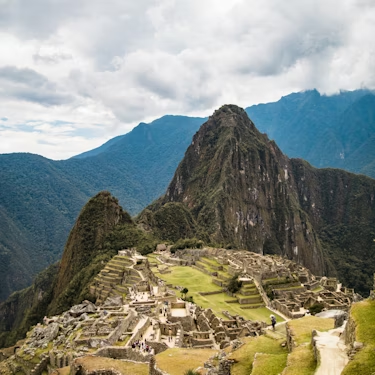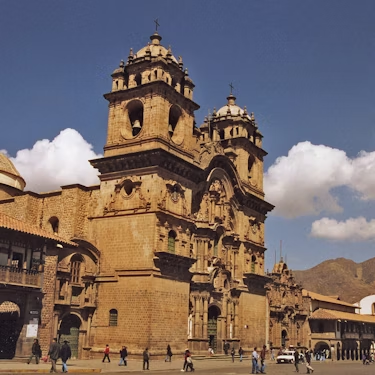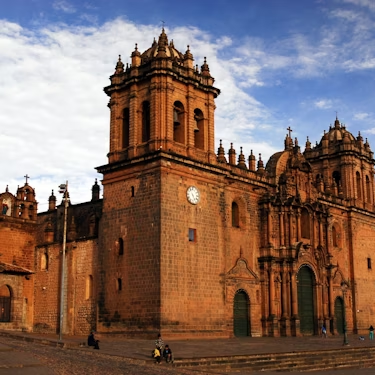More about: 10 Best museums in Cusco
The capital of the Inca Empire, Cuzco, has much to offer, even though the empire fell more than five hundred years ago. In the center of the Peruvian Andes, Cuzco stands as a city that has combined the indigenous and specifically Inca past with the Spanish and finally the Peruvian, so there are many things to see and do in the city that tourists love.
Because there is such a remarkable source of cultural syncretism in Cuzco, museums have flourished. In the city there are many religious, archaeological, regional and even coca museums. Would you like to visit some of these wonderful museums?
1. Museum of Religious Art

Cuzco is known for the Inca power, but the Spanish religious domain left its mark. An essential plan to delve into the history of the city is to book your ticket to the Museum of Religious Art, a beautiful space where you can enjoy the colonial past of the city, from the Catholic point of view.
The best thing about this museum is that you will know the Archbishop's Palace of Cuzco, where the world famous Stone of the 12 angles is located, a diorite rock that has twelve angles that fit in perfect harmony with the rest of the rocks in the environment. This is a sample of the complexity of Inca architecture and you will surely want to take a picture in front of the stone.
Inside the museum you can admire the best colonial religious paintings, with a collection that also includes carvings and altarpieces with gilded inlays. In the Corpus Christi Hall you will find 12 canvases that will dazzle you, but you can also see regional wonders in the Golden Hall, the Zodiac Hall and the Orchard Hall, among others.
Practical information
- Location: Calle Herrajes 38, Cuzco 08002, Peru.
- Price: about 8 euros.
- Hours: 8 a.m. to 6 p.m., Monday to Saturday. Closed on Sundays.
2. Museum of the Monastery of Saint Catherine of Siena

Religious life is always captivating for those who love history and culture. In Cuzco, you cannot miss the Museum of the Monastery of Santa Catalina de Siena, which is located in the majestic Monastery of Santa Catalina. This monastery was built in 1601 over an Inca construction, of which some columns and walls are still preserved.
Inside the monastery, a museum with permanent exhibition was created in 1971. At first, the idea was to show the life of the cloistered nuns throughout history, as well as the artistic productions of the nuns themselves. However, this concept changed and today the museum includes a beautiful collection of colonial religious art, as well as popular art.
The canvases with religious images are the most notable, but there are also sculptures and even crockery used by the nuns. Sometimes these exhibits, permanent or temporary, can take a back seat to the beauty of the monastery and its architecture, which will take you back to the colonial past and the quietness of a convent.
Practical Information
- Location: Calle Santa Catalina, 401, Cuzco.
- Price: about 8 €.
- Hours: Monday to Saturday, 8:30 a.m. to 5:30 p.m.
3. Museum of the Cathedral of Cuzco

One of the most imposing colonial works is the Cathedral of Cuzco and you can buy tickets to visit its museum. This church built in the early sixteenth century with a small chapel is known as the Basilica of the Virgin of the Assumption. A long and imposing church that was built on the same site where the Incas had their government palace, in what is an example of colonial rule.
To get to the Cathedral and its respective museum, you only have to be in front of the Plaza de Armas of Cuzco. In truth, the cathedral is a complex, which includes the Temple of El Triunfo, the first chapel that was erected as a cathedral and the Temple of the Holy Family. All that makes that inside the complex there are 11 chapels that took almost a century and a half to finish.
When you are in the museum you will see colonial liturgical elements, as well as paintings and carvings mainly from the XVII and XVIII centuries. One of the most beautiful is the canvas of The Last Supper, the work of Marcos Zapata. Also the anonymous El Señor de los Temblores is a favorite of tourists. The idea when you are here is to have a great panorama of colonial architecture and art, in a memorable place.
Practical Information
- Location: Plaza de Armas, Cuzco, Peru.
- Price: The entrance fee to the Cuzco Cathedral is around 18 €.
- Hours: daily from 10 a.m. to 6 p.m.
4. Museum of Pre-Columbian Art

Despite all the colonial influence, Cuzco is known for having been the capital of the Inca empire, with all that implies. The Pre-Columbian Art Museum is the main museum of its kind in the city and it houses more than 400 pieces of art in a phenomenal site, which is the Casona Cabrera, in the heart of the city. This museum depends on the BBVA Foundation and its collection belongs to the Larco Museum of Lima.
Most of the museum rooms are divided according to the material of the artwork. There are rooms dedicated to wood, shells, silver and gold, but there are also others that try to show according to the archaeological pieces according to the regions of Peru: south, north and center. Finally, there are other rooms dedicated to explain the historical evolution of the pre-Columbian world: the origins, before the Incas and the Inca imperial expansion.
The composition of this museum will make your tour like a trip to pre-Columbian America, where the different indigenous empires fought for power. Here you will see pieces at least 3,000 years old in a beautiful building like the Casa Cabrera, which before the colony was a school of the Inca nobility. For all these reasons, it is one of the best things to do in Cuzco.
Practical information
- Location: Plaza de las Nazarenas 231, Cuzco.
- Price: For foreigners, the general admission is about 5 €. Foreign students, half price.
- Hours: daily from 8 a.m. to 10 p.m.
5. Inka Museum

Want to stay in the pre-Hispanic vibe? The National University of San Antonio Abad del Cuzco offers locals and tourists a beautiful museum dedicated to specifically Inca art. Cuzco was the capital of the Inca Empire, one of the most important in all of pre-Columbian history and this museum recognizes the importance of this empire in the regional and global context.
This is not a very large museum, so you can do a good tour in an hour, unless you are too detailed. The idea of this museum is to show you how life was lived in the Inca Empire, with a lot of emphasis on ceramics, instruments and real mummies, where you can see how the Incas treated death.
The archaeological findings of this museum usually come from the region of Cuzco, so it is also a regional museum where even skulls of ancient inhabitants of the Inca empire and who lived in that area are shown. Do you dare to know these mummies and other works?
Practical information
- Location: Cuesta Almirante, 103, Cuzco, Peru.
- Price: about 4 €.
- Hours: Monday to Friday from 8 a.m. to 6 p.m. and holidays from 9 a.m. to 4 p.m.
6. Museum of Contemporary Art

It is well known that Cuzco is a city and department known worldwide for its pre-Hispanic influence, but this is not the only type of art you can see in this city. The Museum of Contemporary Art of Cuzco, founded in 1995, is one of the most modern in all of Peru and was founded on the initiative of the mayor's office. In fact, the museum is located in the facilities of the Municipal Palace.
Practically all the works of art in the Museum of Contemporary Art are from the 20th century and there are more than 300, which allows them to have more than 50 temporary exhibitions every year. Most of them are focused on Peruvian artists, but being Cuzco such a touristic city, this museum usually receives different Latin American events of contemporary art.
The museum has mainly three exhibition halls, so you can easily tour it in about 45 minutes and then continue with your day. Don't forget to take pictures with the works of Edilberto Mérida Rodríguez or with the paintings of Remigia Mendoza or Francisco Olazo.
Practical information
- Location: Calle Espinar 270, Cuzco 08002, Peru.
- Price: Most of the time there is no entrance fee.
- Hours: 9:00 a.m. to 6:00 p.m., Monday to Saturday.
7. Museum of the Convent of the Temple of San Francisco

As you can see in Cuzco there are many things to see and do. Specifically, in front of the Plaza de San Francisco in Cuzco is the Temple and Convent of San Francisco, one of the most iconic of the entire Altiplanic city. Originating in 1534, the Spanish Franciscan friars who arrived in the city gave birth to this beautiful church, which was destroyed in 1645 and rebuilt in 1652.
This church is really important in Cuzco, since, together with its convent, it became one of the main religious symbols of the city. Inside the convent, in the cloister, a giant canvas is exhibited, called the Epilogue of the Franciscan order in a tree of twelve branches. According to some experts, it is the largest painting in the entire continent and one of the oldest in the city, because it shows the evolution of the members of the order until the 17th century.
In addition to this canvas, there are many other works such as sculptures, carvings, religious figures, crypts and a huge amount of colonial paintings, mainly with Christian motifs, but with many links to the indigenous world. Are you going to miss the opportunity to see the largest painting in the continent?
Practical information
- Location: in front of the San Francisco square.
- Price: just over 1 €.
- Hours: 9 a.m. to 6 p.m., Monday to Sunday.
8. Coca Museum

Although all over the world coca is related to drugs, the truth is that this is an ancient plant that in the Inca world has had an extremely strong meaning, which has remained present in history. The coca related to industrial drug is only a small part of this plant and if you go to the Coca Museum in Cuzco, you will be able to go into its past.
Inside a beautiful colonial house, the Coca Museum has three exhibition rooms designed to show, through panels, the history of coca in this region of the Andes. Here you can learn about the indigenous origin and its magical and religious significance, as well as the scientific, cultural and social understanding of coca in Peru and Latin America.
This museum does not shy away from debate and is therefore a place for encounters. Here you can also see the many products made with coca, such as drinks and sweets, as well as textiles and artistic representations of coca. Are you going to miss the most controversial museum in Cuzco?
Practical information
- Location: Plaza San Blas 618, 2nd level, Cuzco.
- Price: about 2.5 euros. For students, the entrance is half price.
- Hours: from 9 a.m. to 9 p.m.
9. Museum of the site of Coricancha

Don't let the size fool you: the Coricancha site museum is small, but it is among the most important in the region, because it is where the main archaeological findings of the pre-Columbian civilizations in the Cuzco region are exhibited. Here you can see fragments of ceramics, instruments, tools and lithic pieces both Inca and pre-Inca.
In the five rooms of the museum you can also see different reconstructions from the archaeological finds, so you can see what life was like before the Spanish in the area, all based on the excavations of the site of Coricancha, which in Quechua means courtyard of gold. Most of these findings were found in the late 1990s.
Other aspects that tourists like the most are the large models that reconstruct the Inca city and, specifically, Coricancha. There are also mummies and some perforations of skulls dating from the Inca period. I assure you that this archaeological site is worth a visit. If you are interested in this topic, you can also consider going to the archaeological site of Sacsayhuaman in Cuzco.
Practical information
- Location: Av. El Sol 526, Cuzco 08002, Peru.
- Price: about 2.5 euros.
- Hours: Monday to Saturday from 8 a.m. to 5 p.m., Sundays from 2 p.m. to 4 p.m.
10. Regional Historical Museum - Casa Garcilaso

Many years ago, at the beginning of the 16th century, Inca Garcilaso de la Vega lived in this house. Garcilaso was one of the first mestizos of renown in the American continent, because from the letters he exalted his Inca culture, as well as the Hispanic one. In addition to his work as a writer and poet, the Inca Garcilaso is owed much of the documentary record of Inca culture and its past stories, which were part of the oral tradition.
Today, the Garcilaso house is included in many of the best tours of Cuzco and is functioning as the Regional Historical Museum of Cuzco, which is a monument and heritage of the country. This building has its antecedents in the Inca empire, but was rebuilt by the Spanish and acquired by the father of the Inca Garcilaso. When you are inside, you can take a walk through the thirteen permanent exhibition rooms that tell the history of the city.
Also in this museum, you will see a plurality of exhibits, as at least six rooms are dedicated to archeology, while seven others are focused on art and ethnography, mainly indigenous. This will allow you to have a varied tour where you will have plenty to choose from.
Practical information
- Location: Calle Heladeros s/n, Casa del Inca Garcilaso de la Vega, Cuzco.
- Price: Entrance included in the Cuzco Tourist Ticket.
- Hours: Monday to Sunday, 8 a.m. to 5 p.m.














